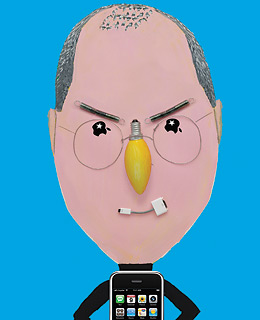
Steve Jobs
Sure, Steve Jobs has been on this list before—in 2004 and 2005, to be specific—but somehow it's never the same Jobs from one year to the next. He has been Jobs the visionary founder, notably at Apple and Pixar. He has done time as Jobs the exile and even as Jobs the failure. Now he has a new role: Jobs the mogul. Clearly he knows how to innovate from the bottom and from the outside. Can he do it from the top?
Let's look at the record. So far this year he has unveiled the iPhone, which has every other cell-phone maker scrambling to get a glimpse of Apple's taillights, and Apple TV, a gutsy grab for the living-room media center. Leopard, a major update to Apple's OS X operating system, is due in October. Meanwhile, Jobs sold his 100 millionth iPod this year, second-quarter Macintosh sales were up 36%, and Apple is showing remarkable financial vitality (and has weathered its stock-options dustup). So far, so cool.
Jobs has also taken a leadership position on digital-rights management (DRM), a deeply wonky but globally important issue that tends to induce tantrums in consumers, music suits and techies alike. Jobs' touch with DRM has been deft, progressive and—dare we say it—statesmanlike.
Jobs is still Jobs. He still projects a manic self-confidence in public. He still, at 54, wears his signature jeans-and-black-turtleneck outfit. And he still has his edge: prosperity hasn't robbed him of his disrespect for conventional wisdom, his spooky ability to see around corners, and his feral determination to make perfect products at all costs. All in all, success becomes him.